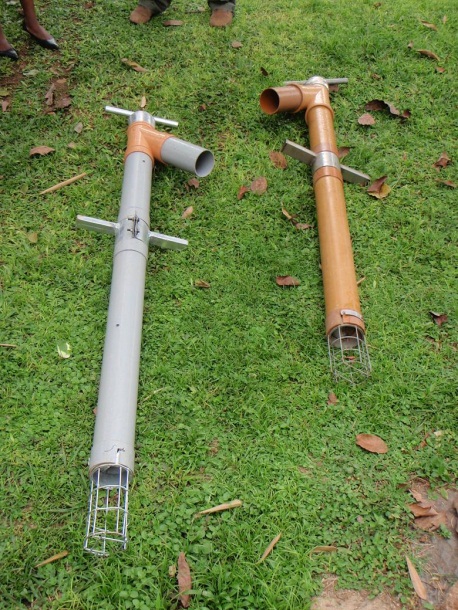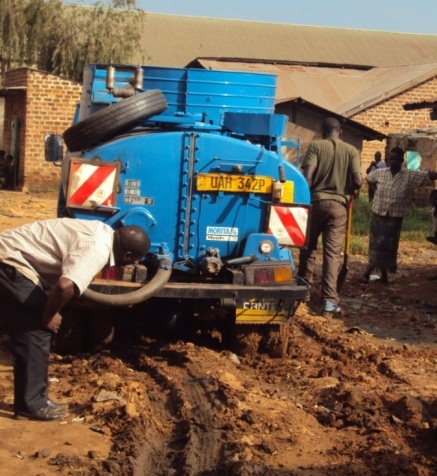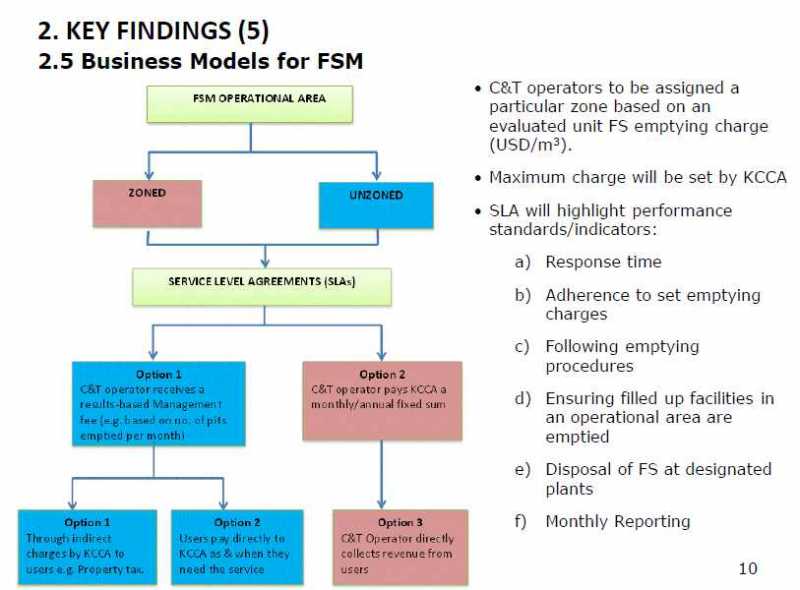- Forum
- categories
- Markets, finance and governance
- Cities (planning, implementation, and management processes)
- Improving Faecal Sludge Management (FSM) for On-Site Sanitation in Kampala City, Uganda (Kampala Capital City Authority with funding by BMGF and DfID)
Improving Faecal Sludge Management (FSM) for On-Site Sanitation in Kampala City, Uganda (Kampala Capital City Authority with funding by BMGF and DfID)
8716 views
- Kiku
-

- Water and Sanitation Specialist
Less- Posts: 38
- Karma: 6
- Likes received: 18
Re: Improving Faecal Sludge Management (FSM) for On-Site Sanitation in Kampala City, Uganda (Kampala Capital City Authority with funding by BMGF and DfID)
Thanks for the Post, Elisabeth. The Analytical Report that paved way for the full-proposal is attached herewith. The Report showcases results of the 6-month situational assessment of Kampala's FSM sub-sector, and the work was financed through a USD 150,000 grant from BMGF/DFID (Phase 1).
Update: The 2nd phase of the Project was, finally, launched on Feb 29, 2016. The Foundation's Danielle Pedi was in Kampala and she can be seen in this video giving an overview wrt the Project:
ft
Update: The 2nd phase of the Project was, finally, launched on Feb 29, 2016. The Foundation's Danielle Pedi was in Kampala and she can be seen in this video giving an overview wrt the Project:
ft
Fredrick Tumusiime, MSc
Skype: tufre80
Skype: tufre80
This message has an attachment file.
Please log in or register to see it.
Please Log in to join the conversation.
You need to login to reply- Elisabeth
-
Topic Author
- User is blocked
- Freelance consultant since 2012
Less- Posts: 3372
- Karma: 54
- Likes received: 932
Improving Faecal Sludge Management (FSM) for On-Site Sanitation in Kampala City, Uganda (Kampala Capital City Authority with funding by BMGF and DfID)
I am introducing today a grant that Kampala City Council Authority recieved from BMGF and DfID under the scheme “City Partnerships for Urban Sanitation Service Delivery in Africa and South Asia”. The information was sent to me by Najib Lukooya Bateganya at KCCA who's asked me to post it for him.
Title of grant: Improving Faecal Sludge Management (FSM) for On-Site Sanitation in Kampala City, Uganda - part of “City Partnerships for Urban Sanitation Service Delivery in Africa and South Asia”
Name of lead organization: Kampala Capital City Authority (KCCA)
Primary contact at lead organization: Najib Lukooya Bateganya, PhD - This email address is being protected from spambots. You need JavaScript enabled to view it.
Grantee location: Kampala, Uganda
Developing country where the research is being or will be tested: Uganda
Grant type: “City Partnerships for Urban Sanitation Service Delivery in Africa and South Asia”
Start and end date:
Phase 1: March – October, 2014; Phase 2: December 2015 (but kick-off only in March) until 31.12.2018
Note: There was a one year gap between Phase 1 and Phase 2: Initial proposal for phase 2 was not selected during the first screening, we had to repackage it to eliminate infrastructure/capital investments that were proposed before. eg construction of new FS Treatment plant.
However, some software components of the 2nd phase eg enhancing institutional collaboration and popularising existing legal provisions relevant to FSM are under implementation (during the past 1 year)
Grant size:
Phase 1: USD 27,418 (from BMGF) (as per BMGF grant database here ) plus support from DfID (UK): $ 122,582
Phase 2: USD 413,062 (from BMGF) (as per BMGF grant database here ) plus support from DfID (UK): USD 1,559,563
The rest of this project description is only for Phase 1 of the project. Phase 2 will be introduced after the kick-off in a few months.
Short description of the project (Phase 1):
The project was research-based and focused on assessing a private sector service delivery model for improving FSM in Kampala City.
Goal(s): not provided
Objectives (Phase 1):
The specific objectives of the study included;
(i) Profiling the Kampala sanitation market;
(ii) Analyzing the existing policy, legal and institutional framework related to FSM
(iii) Investigating the applicability of binding service level agreements (SLAs)
(iv) Development of feasible business/financial models for FSM in Kampala.
Research or implementation partners:
National Water and Sewerage Corporation, Reform for Urban Water and Sanitation Sector (RUWASS)-GIZ Uganda, Makerere University
Links, further readings – results to date (Phase 1):
See presentation at BMGF-DfID cities partnership meeting in Hanoi in January 2015:
Two important slides from this study:
Key findings of the study:
Sanitation Market Assessment
The Sanitation market is based on the quantity of faecal sludge generated from households, institutions and commercial establishments in Kampala and its neighboring areas such Mukono and Wakiso.
--> for more details see attached document at the very end of this post.
Faecal Sludge Management Technologies
The main FS emptying technologies used in Kampala include: Pure manual pit emptying, semi-mechanized pit emptying (mainly constituting) the “Sludge Gulper” and the vacuum tankers which are mostly used for emptying of septic tanks and lined pits.
Faecal sludge in Kampala is currently treated at a single treatment plant whose design capacity is 400 m3/day and 5,000 m3/day for faecal sludge and wastewater treatment respectively. The FS treatment processes at the plant include sedimentation (settling tanks), co-treatment with wastewater (stabilization ponds) and solar drying (sludge drying beds).
Treated sludge from drying beds is used as a soil conditioner and organic fertilizer, which is the only faecal sludge reuse option being implemented in Kampala on a moderate scale. However, there are a number of emerging reuse technologies in Kampala.
--> for more details see attached document at the very end of this post.
Policy, Regulatory and Institutional Analysis
The existing regulations that are relevant to faecal sludge (FS) management in Kampala include: The Public Health Act 1935 (Cap.281); The KCCA Act, 2010; The Local Government Act 1997 (Cap.243); The Local Governments (Kampala City) (Sanitation of Building Sites) Byelaws; The Public Private Partnership Bill, 2012; and The National Environment (Waste Management) Regulations S.I. No 52/1999.
The proposed institutional/operational framework will include the following stakeholders: KCCA (responsible for regulation and setting of service level standards), NEMA (responsible for FS transportation licensing), FS collection and transportation operators, NWSC (in charge of FS treatment), users (payment for FS C&T services) and re-users of FS end products. Currently, the FS collection and transportation operators carry-out their business informally. In order to achieve a workable PPP (SLA) arrangement, the FS C&T operators must constitute themselves into legal entities (registered companies).
--> for more details see attached document at the very end of this post.
Business and Financial Models
Currently, the FS C&T service providers operate in an environment that is unrestricted and unregulated. In addition, no formal obligations exist between the service providers and KCCA and there are no minimum service level standards for the former to fulfil. The users pay for the services directly to the C&T operators as and when they need services.
The following FSM business model is proposed for Kampala: Creation of operational territories (based on the 5 divisions of Kampala city) for FS C&T service providers; Awarding service level contracts to FS C&T providers for the respective zones through a competitive bidding process. One of the bidding parameters will be the unit FS emptying charge (USD/m3) proposed by a C&T operator for a respective zone; and the collection of user fees by the service providers. The FS C&T operators will be required to remit a fixed (monthly or annual) operational fee to KCCA.
To achieve a viable business and financial model, there will be need to:
i) Develop and maintain a sanitation GIS based database for Kampala for planning resource allocation and monitoring of service provision;
ii) Implement binding Service Level Agreements (SLAs) for Faecal Sludge Collection and Transportation (FS C&T) to ensure regulated, efficient and affordable services;
iii) Provide credit financing for capital equipment to meet the demand for FS generated from Kampala;
iv) Conduct social/sanitation marketing throughout the city to improve peoples’ willingness to adopt and pay for improved sanitation solutions;
v) Construct an additional FS treatment plant to increase the FS treatment capacity and reduce FS transportation costs; this would require institutional collaboration between NWSC and KCCA to bridge the treatment gap.
vi) Implement a subsidy program for construction of standard sanitation facilities for the urban poor;
vii) Implement a voucher based payment systems for subsidizing FS emptying in targeted urban poor communities;
viii) Train service providers and KCCA sanitation staff for effective service provision and regulation respectively;
ix) Research on low cost pit lining and emptying technologies;
x) Upgrade the existing call centre to bridge the gap between users and service providers and improve efficiency (e.g. reduction in the response time for receiving services).
--> for more details see attached document at the very end of this post.
Current state of affairs:
In preparation phase for implementation of the key findings with funding from BMGF & DfID-UK (this is Phase 2 of the project which has now been approved and will start soon)
The specific scope of work under this project will include:
i) Developing and maintaining a sanitation GIS-based database for Kampala for planning resource allocation and monitoring of service provision;
ii) Implementing binding Service Level Agreements (SLAs) for Faecal Sludge Collection and Transportation (FS C&T) to ensure regulated, efficient and affordable services;
iii) Conducting social and sanitation marketing measures throughout the city to improve peoples’ willingness to adopt and pay for improved sanitation solutions;
iv) Building capacity of service providers and KCCA staff for effective service provision and regulation, respectively; and
v) Upgrading the existing KCCA client care services to include a call centre which will bridge the gap between users and service providers hence improved efficiency (e.g. reduction in the response time for receiving services).
Biggest successes so far:
Securing funding for the second Phase
Main challenges / frustration:
Regards,
Elisabeth - posting information received from Najib
Important abbreviations used in this post:
FS = fecal sludge
C&T = Collection & transport
DfID = UK Department for International Development, see e.g. en.wikipedia.org/wiki/Department_for_International_Development
KCCA = Kampala Capital City Authority, see e.g. en.wikipedia.org/wiki/Kampala_Capital_City_Authority
SLA = Service level agreement
Title of grant: Improving Faecal Sludge Management (FSM) for On-Site Sanitation in Kampala City, Uganda - part of “City Partnerships for Urban Sanitation Service Delivery in Africa and South Asia”
Name of lead organization: Kampala Capital City Authority (KCCA)
Primary contact at lead organization: Najib Lukooya Bateganya, PhD - This email address is being protected from spambots. You need JavaScript enabled to view it.
Grantee location: Kampala, Uganda
Developing country where the research is being or will be tested: Uganda
Grant type: “City Partnerships for Urban Sanitation Service Delivery in Africa and South Asia”
Start and end date:
Phase 1: March – October, 2014; Phase 2: December 2015 (but kick-off only in March) until 31.12.2018
Note: There was a one year gap between Phase 1 and Phase 2: Initial proposal for phase 2 was not selected during the first screening, we had to repackage it to eliminate infrastructure/capital investments that were proposed before. eg construction of new FS Treatment plant.
However, some software components of the 2nd phase eg enhancing institutional collaboration and popularising existing legal provisions relevant to FSM are under implementation (during the past 1 year)
Grant size:
Phase 1: USD 27,418 (from BMGF) (as per BMGF grant database here ) plus support from DfID (UK): $ 122,582
Phase 2: USD 413,062 (from BMGF) (as per BMGF grant database here ) plus support from DfID (UK): USD 1,559,563
The rest of this project description is only for Phase 1 of the project. Phase 2 will be introduced after the kick-off in a few months.
Short description of the project (Phase 1):
The project was research-based and focused on assessing a private sector service delivery model for improving FSM in Kampala City.
Goal(s): not provided
Objectives (Phase 1):
The specific objectives of the study included;
(i) Profiling the Kampala sanitation market;
(ii) Analyzing the existing policy, legal and institutional framework related to FSM
(iii) Investigating the applicability of binding service level agreements (SLAs)
(iv) Development of feasible business/financial models for FSM in Kampala.
Research or implementation partners:
National Water and Sewerage Corporation, Reform for Urban Water and Sanitation Sector (RUWASS)-GIZ Uganda, Makerere University
Links, further readings – results to date (Phase 1):
See presentation at BMGF-DfID cities partnership meeting in Hanoi in January 2015:
This attachment is hidden for guests.
Please log in or register to see it.
Please log in or register to see it.
Two important slides from this study:
Key findings of the study:
Sanitation Market Assessment
The Sanitation market is based on the quantity of faecal sludge generated from households, institutions and commercial establishments in Kampala and its neighboring areas such Mukono and Wakiso.
--> for more details see attached document at the very end of this post.
Faecal Sludge Management Technologies
The main FS emptying technologies used in Kampala include: Pure manual pit emptying, semi-mechanized pit emptying (mainly constituting) the “Sludge Gulper” and the vacuum tankers which are mostly used for emptying of septic tanks and lined pits.
Faecal sludge in Kampala is currently treated at a single treatment plant whose design capacity is 400 m3/day and 5,000 m3/day for faecal sludge and wastewater treatment respectively. The FS treatment processes at the plant include sedimentation (settling tanks), co-treatment with wastewater (stabilization ponds) and solar drying (sludge drying beds).
Treated sludge from drying beds is used as a soil conditioner and organic fertilizer, which is the only faecal sludge reuse option being implemented in Kampala on a moderate scale. However, there are a number of emerging reuse technologies in Kampala.
--> for more details see attached document at the very end of this post.
Policy, Regulatory and Institutional Analysis
The existing regulations that are relevant to faecal sludge (FS) management in Kampala include: The Public Health Act 1935 (Cap.281); The KCCA Act, 2010; The Local Government Act 1997 (Cap.243); The Local Governments (Kampala City) (Sanitation of Building Sites) Byelaws; The Public Private Partnership Bill, 2012; and The National Environment (Waste Management) Regulations S.I. No 52/1999.
The proposed institutional/operational framework will include the following stakeholders: KCCA (responsible for regulation and setting of service level standards), NEMA (responsible for FS transportation licensing), FS collection and transportation operators, NWSC (in charge of FS treatment), users (payment for FS C&T services) and re-users of FS end products. Currently, the FS collection and transportation operators carry-out their business informally. In order to achieve a workable PPP (SLA) arrangement, the FS C&T operators must constitute themselves into legal entities (registered companies).
--> for more details see attached document at the very end of this post.
Business and Financial Models
Currently, the FS C&T service providers operate in an environment that is unrestricted and unregulated. In addition, no formal obligations exist between the service providers and KCCA and there are no minimum service level standards for the former to fulfil. The users pay for the services directly to the C&T operators as and when they need services.
The following FSM business model is proposed for Kampala: Creation of operational territories (based on the 5 divisions of Kampala city) for FS C&T service providers; Awarding service level contracts to FS C&T providers for the respective zones through a competitive bidding process. One of the bidding parameters will be the unit FS emptying charge (USD/m3) proposed by a C&T operator for a respective zone; and the collection of user fees by the service providers. The FS C&T operators will be required to remit a fixed (monthly or annual) operational fee to KCCA.
To achieve a viable business and financial model, there will be need to:
i) Develop and maintain a sanitation GIS based database for Kampala for planning resource allocation and monitoring of service provision;
ii) Implement binding Service Level Agreements (SLAs) for Faecal Sludge Collection and Transportation (FS C&T) to ensure regulated, efficient and affordable services;
iii) Provide credit financing for capital equipment to meet the demand for FS generated from Kampala;
iv) Conduct social/sanitation marketing throughout the city to improve peoples’ willingness to adopt and pay for improved sanitation solutions;
v) Construct an additional FS treatment plant to increase the FS treatment capacity and reduce FS transportation costs; this would require institutional collaboration between NWSC and KCCA to bridge the treatment gap.
vi) Implement a subsidy program for construction of standard sanitation facilities for the urban poor;
vii) Implement a voucher based payment systems for subsidizing FS emptying in targeted urban poor communities;
viii) Train service providers and KCCA sanitation staff for effective service provision and regulation respectively;
ix) Research on low cost pit lining and emptying technologies;
x) Upgrade the existing call centre to bridge the gap between users and service providers and improve efficiency (e.g. reduction in the response time for receiving services).
--> for more details see attached document at the very end of this post.
Current state of affairs:
In preparation phase for implementation of the key findings with funding from BMGF & DfID-UK (this is Phase 2 of the project which has now been approved and will start soon)
The specific scope of work under this project will include:
i) Developing and maintaining a sanitation GIS-based database for Kampala for planning resource allocation and monitoring of service provision;
ii) Implementing binding Service Level Agreements (SLAs) for Faecal Sludge Collection and Transportation (FS C&T) to ensure regulated, efficient and affordable services;
iii) Conducting social and sanitation marketing measures throughout the city to improve peoples’ willingness to adopt and pay for improved sanitation solutions;
iv) Building capacity of service providers and KCCA staff for effective service provision and regulation, respectively; and
v) Upgrading the existing KCCA client care services to include a call centre which will bridge the gap between users and service providers hence improved efficiency (e.g. reduction in the response time for receiving services).
Biggest successes so far:
Securing funding for the second Phase
Main challenges / frustration:
- Political interference: Varying political interests may delay implementation of planned project activities. This will be mitigated by engaging political leaders in community moblisation at different administrative levels. Additionally, there will be constant dialogue with the politicians from project inception to completion.
- Private sector buy-in. There is a risk that the buy-in for binding SLAs with the existing FS C&T operators may be prolonged since they have been operating informally in an open market. This will be mitigated through constant dialogue, sensitization and training of the FS C&T operators. In addition the rolling out of SLAs will be carried out in a phased manner.
Regards,
Elisabeth - posting information received from Najib
Important abbreviations used in this post:
FS = fecal sludge
C&T = Collection & transport
DfID = UK Department for International Development, see e.g. en.wikipedia.org/wiki/Department_for_International_Development
KCCA = Kampala Capital City Authority, see e.g. en.wikipedia.org/wiki/Kampala_Capital_City_Authority
SLA = Service level agreement
Dr. Elisabeth von Muench
Freelance consultant on environmental and climate projects
Freelance consultant on environmental and climate projects
Attachments:
-
 Gulperphoto.jpg
(Filesize: 177KB)
Gulperphoto.jpg
(Filesize: 177KB)
-
 vacuumtankerphoto.jpg
(Filesize: 97KB)
vacuumtankerphoto.jpg
(Filesize: 97KB)
-
 slidewithk...ngs1.jpg
(Filesize: 46KB)
slidewithk...ngs1.jpg
(Filesize: 46KB)
-
 slidewithk...ngs2.jpg
(Filesize: 43KB)
slidewithk...ngs2.jpg
(Filesize: 43KB)
The following user(s) like this post: Kiku, ddiba
Please Log in to join the conversation.
You need to login to reply
Share this thread:
- Forum
- categories
- Markets, finance and governance
- Cities (planning, implementation, and management processes)
- Improving Faecal Sludge Management (FSM) for On-Site Sanitation in Kampala City, Uganda (Kampala Capital City Authority with funding by BMGF and DfID)
Recently active users. Who else has been active?
Time to create page: 0.343 seconds







